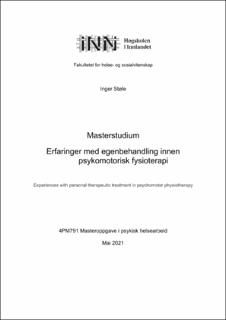Erfaringer med egenbehandling innen psykomotorisk fysioterapi
Master thesis
Permanent lenke
https://hdl.handle.net/11250/2888981Utgivelsesdato
2021Metadata
Vis full innførselSammendrag
Bakgrunn:
Psykomotorisk fysioterapi er en videreutdannelse for fysioterapeuter. I denne utdannelsen inngår det et krav om å ta 20 egenbehandlinger for å få takst kompetanse. En takst kompetanse vil si at en fysioterapeut med en videreutdannelse kan benytte egne spesifikke takster ved behandling av pasienter. Det finnes lite kunnskap om hvordan denne egenbehandlingen erfares, derfor ønsker jeg å bidra med økt forståelse på dette området.
Hensikt og problemstilling:
I denne masteroppgaven i psykisk helsearbeid var hensikten å finne ut hvilken betydning egenbehandling har personlig og terapeutisk. Problemstillingen var følgende:
Hvordan erfarer psykomotoriske fysioterapeuter egenbehandling, og hvilken betydning har disse erfaringene for deres arbeid som terapeuter?
Metode:
Metoden var kvalitativ basert på en hermeneutisk og pragmatisk tilnærming. I alt ble fem psykomotoriske fysioterapeuter intervjuet med en semistrukturert guide. Systematisk tekstkondensering, som er utviklet av Malterud, ble benyttet som analysestrategi.
Resultater:
Det var fire følgende hovedfunn: Terapeutens væremåte var sentral for utbyttet. Egenbehandling gav stor mening. Erfaring av utfordrende hendelser i egenbehandling og Terapeuten som modell for egen praksis i psykomotorisk fysioterapi.
Konklusjon:
Informantene formidlet flest positive erfaringer og opplevelser med egenbehandling, men det kom også frem nyanser av det å kjenne på egne grenser og ubehag. De la merke til terapeutens væremåte, hvordan terapeuten ordla seg og hvor oppmerksomme de var til det som skjedde under behandlingen. Informantene fikk innsikt i egen helse, og kunne utfra disse erfaringene reflektere rundt egen terapeutrolle. Denne formen for erfaringsbasert kunnskap bidro til å gi større bevissthet til egen kropp og følelsesliv. For psykomotoriske fysioterapeuter vil egenbehandling kunne styrke både egen psykiske helse, samt mulighet til å hjelpe andre.
Nøkkelord:
Egenbehandling, psykomotorisk fysioterapi, egenutvikling, kommunikasjon, veiledningsteorier, selvinnsikt. ABSTRACT
Background:
Psychomotoric therapy is an in-service education course for physiotherapists. The course requires a total of 20 self-treatments to qualify the physiotherapist to charge for the treatment. There is little knowledge about how self-treatment works, and the aim of this study is to improve our understanding and knowledge of this particular area.
Purpose and thesis-question:
In this Master`s thesis in mental healthcare, the aim was to investigate the utility of selftreatment in a personal and therapeutic perspective. The these- question that is to be addressed in this thesis is: How do psychomotoric therapists experience self-treatment, and how do their experiences impact on their work as therapists?
Method:
The research design was qualitative, drawing on a hermeneutic and pragmatic approach. Five Psychomotoric therapists are interviewed using semi-structured guide. The analysis uses Malterud’s systematic text condensing approach.
Results:
There were four main findings: The therapist`s behavior was central to the outcome, Personal treatment had great meaning, Challenging experiences with self-treatments and the therapist as a model for his own practice in psychomotor therapy.
Conclusion:
In sum, the interviews provided mostly positive experiences with self-treatment, but there were also some nuances, first and foremost with experiencing one's own limitations and the discomfort with the treatment. They noticed the therapist`s behaviour, as to how the therapist worded himself or herself, and to what extent they were actively aware of what happened during the treatment. This kind of experience-based knowledge contributed to the informants gaining greater insight into their own health, which in turn enabled them to reflect on their own role as a therapist. For psycomotor therapists this means that self-treatment can improve their own mental health, and in turn their ability to help others as well.
Keywords:
Self-treatment, psychomotor physical therapy, self-treatment, communication, guidance theories, self-insight.
